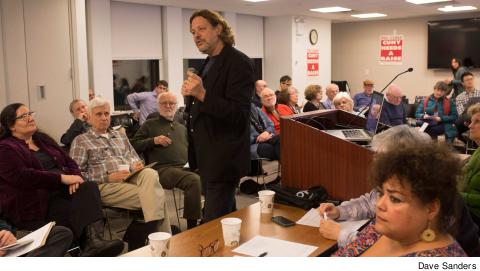“After this election, we really need to organize,” Queens College geology professor Stephen Pekar told a PSC forum on climate change on November 30 – a week before then-President-elect Donald Trump nominated climate-change denier Scott Pruitt to head the Environmental Protection Agency. With the CUNY system encompassing more than 20 campuses and more than 500,000 students, said moderator and PSC retiree Nancy Romer, “We have the capacity to have a huge effect.”
HOTTEST YEARS
“Hominids have never seen anything like this,” Pekar, who specializes in paleoclimatology, warned. Carbon-dioxide levels in the atmosphere have risen from 280 parts per million to 400 since the Industrial Revolution. Those levels haven’t been that high in three million years, he said, adding that 2015 was the hottest year on record, 1.62 degrees Celsius above the 20th-century average. (After the event, NASA confirmed that 2016 was even hotter.) If carbon dioxide emissions continue at their current pace, Pekar said, the Earth will be 5 degrees Celsius hotter by 2100 – a climate change as extreme as the Ice Age. A 2-degree Celsius increase 125,000 years ago partially melted the West Antarctic ice sheet and raised sea levels by 20 feet.
It is utterly absurd to claim that this warming is coming from natural causes, said Pekar. Natural causes of climate change operate on a scale of 1,000 to 1 million years. Any attempt to explain it without “anthropogenic” causes – destruction of forests and carbon dioxide, methane, and aerosol emissions – simply doesn’t match the data.
“We really need to end fossil fuels immediately,” Pekar said.
 |
ACTION NEEDED
What can CUNY and its faculty and staff do to help accomplish that? Ideas broached by the three panelists and some of the people in the audience fell into three categories: using CUNY’s resources to educate people about climate change, trying to make CUNY and related institutions operate more sustainably, and working with community groups to organize for better policies.
Fighting climate change should be a part of the college curriculum, said panelists Elizabeth Yeampierre, executive director of UPROSE, a Latino community group in Brooklyn’s Sunset Park neighborhood, and longtime activist Leslie Cagan, who is organizing a march on Washington scheduled for April 29. Econo-mics, technology and urban studies all have an environmental aspect, Pekar said, and knowledge is crucial when the media didn’t ask a single question about climate change during the presidential debates.
Others suggested holding workshops and classes on climate change and putting out guides to environmental sustainability. John Jay College already has a course on sustainability, Pekar said.
A GREENER CUNY?
CUNY “should be 100 percent solar, if that is possible,” one woman in the audience urged. (The savings, she added, should be used to reduce tuition and pay adjuncts more.) In New York City, Cagan said, 70 percent of emissions come from large buildings, but getting Mayor Bill de
Blasio’s administration and the state government to commit to converting public buildings to renewable energy “hasn’t been so easy.”
The obstacles are more political than technological. Solar-reflector technology that concentrates heat, said Pekar, enables 24-hour power generation and ends the “cloudy days” dilemma.
Others suggested requiring all CUNY vendors to be environmentally sustainable businesses, and enlisting unions to pressure CUNY and the city and state pension funds to divest from fossil fuels.
The transition away from an extractive economy is essential, but it has to be just, Yeampierre said – it must preserve blue-collar jobs. One thing CUNY economists could do to help is advise people on how to do that, for example, on how to finance building and running community-owned solar-power production.
The state government authorizes local governments to buy solar power from private contractors, but these agreements usually don’t require union labor or local hiring, said Jon Forster of the Civil Service Technical Guild, Local 375 of District Council 37.
BROAD CHANGE
The old saying “think globally, act locally” is particularly appropriate, said Cagan, because it’s difficult to organize on a global scale. Climate change can only be stopped with broader social change, said Pekar, and consumer choices help, but they’re not enough. “Laws are more important than changing light bulbs,” Pekar said.
The next steps, said Graduate Center sociology student Darren Kwong, a member of the PSC’s Environmental Justice Working Committee, include “trying to continue building capacity,” working more with student groups, and mobilizing for the April 29 march on Washington.

